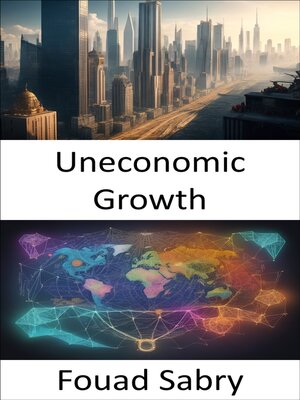Uneconomic Growth
ebook ∣ Redefining Prosperity, Navigating the Paradox of Uneconomic Growth · Economic Science
By Fouad Sabry

Sign up to save your library
With an OverDrive account, you can save your favorite libraries for at-a-glance information about availability. Find out more about OverDrive accounts.
Find this title in Libby, the library reading app by OverDrive.



Search for a digital library with this title
Title found at these libraries:
| Library Name | Distance |
|---|---|
| Loading... |
What is Uneconomic Growth
When economic growth either reflects or causes a reduction in the quality of living, this type of growth is referred to as uneconomic growth. Human development theory, welfare theory, and ecological economics are all examples of fields that make use of this notion. Although it is commonly believed that ecological economist Herman Daly is the originator of the concept, it is possible that other thinkers may also be credited with its conception. As Daly points out, "uneconomic growth occurs when increases in production come at an expense in resources and well-being that is worth more than the items made." One school of thought contends that the cost, or reduction in well-being, that is linked with prolonged economic expansion is the result of "the social and environmental sacrifices made necessary by that growing encroachment on the eco-system."
How you will benefit
(I) Insights, and validations about the following topics:
Chapter 1: Uneconomic growth
Chapter 2: Economic growth
Chapter 3: Ecological economics
Chapter 4: Energy economics
Chapter 5: Overconsumption (economics)
Chapter 6: Ecological modernization
Chapter 7: Genuine progress indicator
Chapter 8: Jevons paradox
Chapter 9: Green economy
Chapter 10: Herman Daly
Chapter 11: Steady-state economy
Chapter 12: Nicholas Georgescu-Roegen
Chapter 13: Rebound effect (conservation)
Chapter 14: Degrowth
Chapter 15: Regenerative economic theory
Chapter 16: Eco-economic decoupling
Chapter 17: Post-growth
Chapter 18: Dematerialization (economics)
Chapter 19: Ecomodernism
Chapter 20: Giorgos Kallis
Chapter 21: Growth imperative
(II) Answering the public top questions about uneconomic growth.
(III) Real world examples for the usage of uneconomic growth in many fields.
Who this book is for
Professionals, undergraduate and graduate students, enthusiasts, hobbyists, and those who want to go beyond basic knowledge or information for any kind of Uneconomic Growth.







